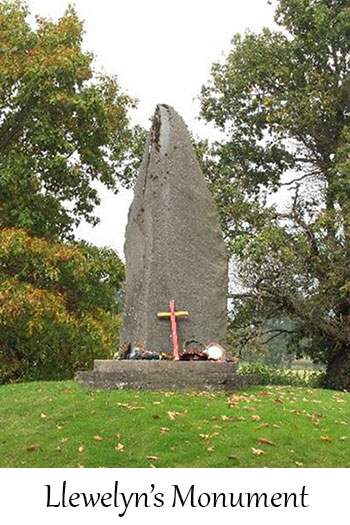|
At the time of the Norman conquest of England in 1066, the dominant ruler in Wales was Bleddyn ap Cynfyn, who was king of Gwynedd and Powys. The initial Norman successes were in the south, where William Fitz Osbern overran Gwent before 1070. By 1074 the forces of the Earl of Shrewsbury were ravaging Deheubarth.
The killing of Bleddyn ap Cynfyn in 1075 led to civil war and gave the Normans an opportunity to seize lands in North Wales. In 1081 Gruffudd ap Cynan, who had just won the throne of Gwynedd from Trahaearn ap Caradog at the Battle of Mynydd Carn was enticed to a meeting with the Earl of Chester and Earl of Shrewsbury and promptly seized and imprisoned, leading to the seizure of much of Gwynedd by the Normans. In the south William the Conqueror advanced into Dyfed founding castles and mints at St David's and Cardiff. Rhys ap Tewdwr of Deheubarth was killed in 1093 in Brycheiniog, and his kingdom was seized and divided between various Norman lordships.The Norman conquest of Wales appeared virtually complete.
In 1094, however, there was a general Welsh revolt against Norman rule, and gradually territories were won back. Gruffudd ap Cynan was eventually able to build a strong kingdom in Gwynedd. His son, Owain Gwynedd, allied with Gruffydd ap Rhys of Deheubarth won a crushing victory over the Normans at the Battle of Crug Mawr in 1136 and annexed Ceredigion. Owain followed his father on the throne of Gwynedd the following year and ruled until his death in 1170. He was able to profit from disunity in England, where Stephen of Blois and the Empress Matilda were engaged in a struggle for the throne, to extend the borders of Gwynedd further east than ever before.
Powys also had a strong ruler at this time in Madog ap Maredudd, but when his death in 1160 was quickly followed by the death of his heir, Llywelyn ap Madog, Powys was split into two parts and never subsequently reunited. In the south, Gruffydd ap Rhys was killed in 1137, but his four sons, who all ruled Deheubarth in turn, were eventually able to win back most of their grandfather's kingdom from the Normans. The youngest of the four, Rhys ap Gruffydd (The Lord Rhys) ruled from 1155 to 1197. In 1171 Rhys met King Henry II and came to an agreement with him whereby Rhys had to pay a tribute but was confirmed in all his conquests and was later named Justiciar of South Wales. Rhys held a festival of poetry and song at his court at Cardigan over Christmas 1176 which is generally regarded as the first recorded Eisteddfod. Owain Gwynedd's death led to the splitting of Gwynedd between his sons, while Rhys made Deheubarth dominant in Wales for a time.
Out of the power struggle in Gwynedd eventually arose one of the greatest of Welsh leaders, Llywelyn ab Iorwerth, also known as Llywelyn Fawr (the Great), who was sole ruler of Gwynedd by 1200 and by his death in 1240 was effectively ruler of much of Wales. Llywelyn made his 'capital' and headquarters at Abergwyngregyn on the north coast, overlooking the Menai Strait. His son Dafydd ap Llywelyn followed him as ruler of Gwynedd, but king Henry III of England would not allow him to inherit his father's position elsewhere in Wales. War broke out in 1241 and then again in 1245, and the issue was still in the balance when Dafydd died suddenly at Abergwyngregyn, without leaving an heir in early 1246. Llywelyn the Great's other son, Gruffudd had been killed trying to escape from the Tower of London in 1244. Gruffudd had left four sons, and a period of internal conflict between three of these ended in the rise to power of Llywelyn ap Gruffudd (also known as Llywelyn Ein Llyw Olaf – Llywelyn, Our Last Leader). The Treaty of Montgomery in 1267 confirmed Llywelyn in control, directly or indirectly, over a large part of Wales. However, Llywelyn's claims in Wales conflicted with Edward I of England, and war followed in 1277. Llywelyn was obliged to seek terms, and the Treaty of Aberconwy greatly restricted his authority. War broke out again when Llywelyn's brother Dafydd ap Gruffudd attacked Hawarden Castle on Palm Sunday 1282. On 11 December 1282, Llywelyn was lured into a meeting in Builth Wells castle with unknown Marchers, where he was killed and his army subsequently destroyed. His brother Dafydd ap Gruffudd continued an increasingly forlorn resistance. He was captured in June 1283 and was hanged, drawn and quartered at Shrewsbury. In effect Wales became England's first colony until it was finally annexed through the Laws in Wales
|

